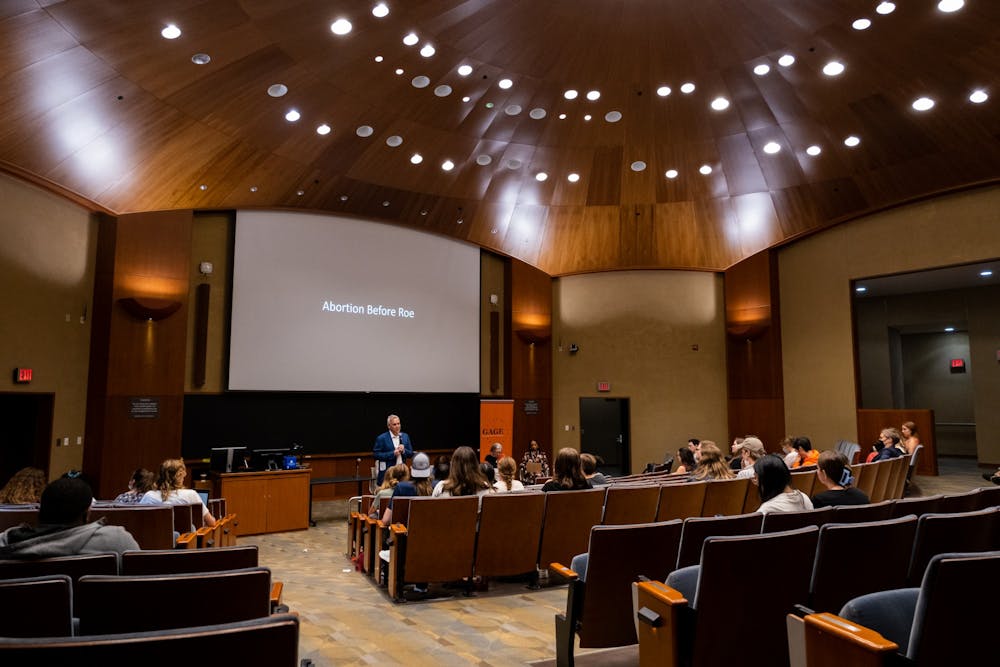Governing America in a Global Era hosted a panel Thursday evening that addressed abortion rights in light of the recent overturn of Roe v. Wade. The panel was composed of Bonnie Hagerman, assistant professor of women, gender and sexuality, Law Prof. Naomi Cahn, Law Prof. Danielle Citron, Penny Von Eschen, professor of history and American studies and Larycia Hawkins, assistant professor of politics and religious studies.
Roe v. Wade was overturned in a landmark case this summer, whose decision was leaked weeks before the release of the majority opinion. The case — Dobbs v. Jackson’s Women Health Organization — overturned 50 years of legal precedent, leaving many Americans wondering about the future of reproductive healthcare.
This panel event was open to the public and no registration was required. About 50 people were in attendance.
GAGE is a research initiative created by a partnership between the Jefferson Scholars Foundation and the College of Arts and Sciences. Led by History Prof. William Hitchcock, GAGE’s goal is to analyze the U.S. in a global context.
The panel began as Hagerman gave an overview of the legality of abortion before Roe. She said that up until 1839, arguments about regulating abortion were focused on British common law. It was only with the formation and perpetuation of the American Medical Association that abortion laws became widely codified.
“AMA has signed on, and abortion increasingly becomes legalized [and] criminalized over time,” Hagerman said.
Cahn then gave a legal overview of both Roe v. Wade and Planned Parenthood v. Casey. She discussed Supreme Court Justice Blackmun’s written decision in Roe, which looks at abortion through the lens of the Fourteenth Amendment.
“The fetus [is] not…a person for purposes of the due process clause, for purposes of the Fourteenth Amendment, and therefore not endowed with a constitutional protected right to life,” Cahn said.
Throughout the presentation, speakers emphasized the importance of the due process clause of the Fourteenth Amendment. In addition to forming the basis for arguments in favor of abortion, the due process clause is also the legal basis for other privacy rights, such as the use of contraceptives.
Citron — who specializes in privacy laws — discussed the Dobbs ruling in relation to personal privacy. She said about one-fourth of girls and women currently use health apps, including period tracking programs. These apps collect health data and location data, which can be bought by third parties and then theoretically used to determine who might have had an abortion.
Von Eschen then compared current U.S. abortion law with other countries around the world. She said that more than 50 countries over the past several decades have liberalized their abortion laws, which makes the U.S. an outlier. Among other countries who have more restrictive reproduction rights than the U.S. today are Poland, Iran, Russia and North Korea.
Hawkins concluded the panel by analyzing racial relations within abortion politics. Hawkins noted that white women were often the organizers and drivers of pro-abortion efforts, which left out people of color.
After the presentation, the panel took questions from the audience.
One audience member asked about the legal right to travel for abortions — meaning whether or not someone who lives in a state where abortion is illegal could theoretically travel and receive an abortion in a state where abortion remains legal. Cahn said it is still unclear how the Court will react when faced with that decision.
“It might be that the court will decide in favor of protecting the right to travel for purposes of an abortion, but we don’t know,” Cahn said.
Hitchcock hopes students will recognize the changing nature of legal decisions.
“What I want students to take away is that legal decisions are constructive, and they have a history … I want people to see change over time,” Hitchcock said.







